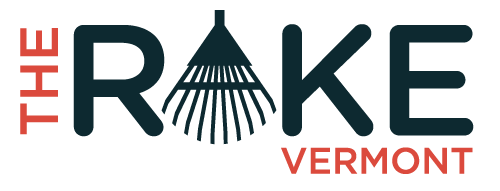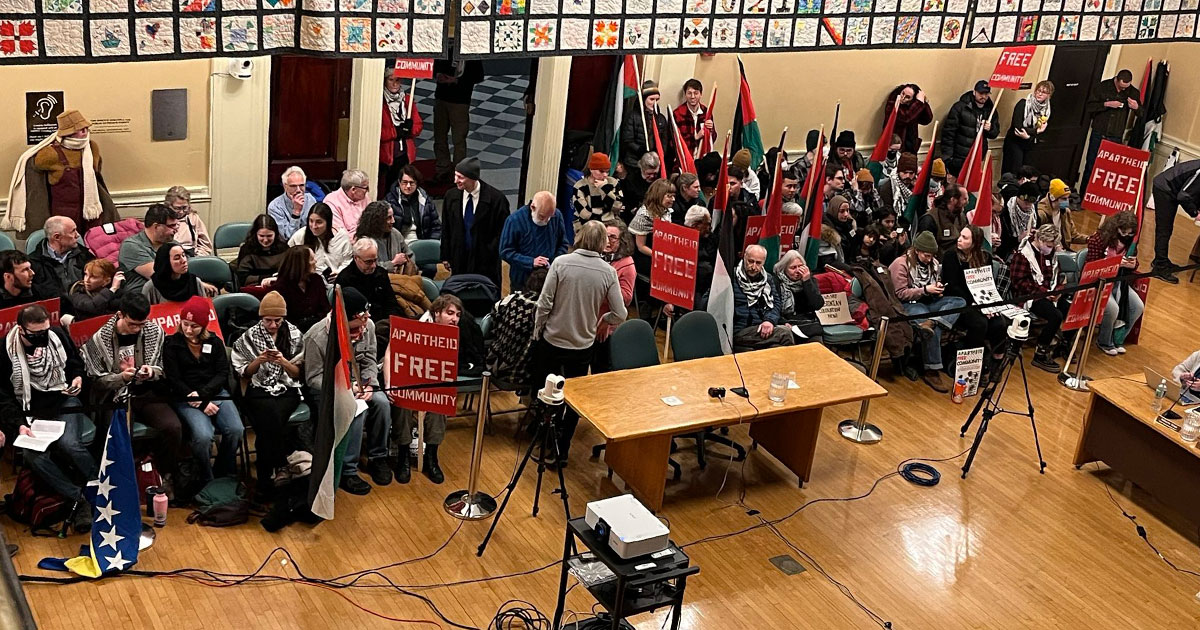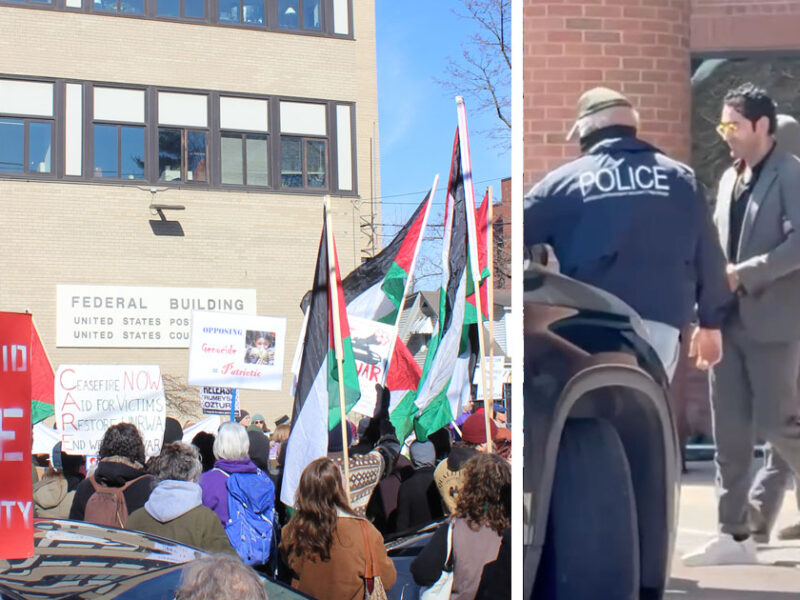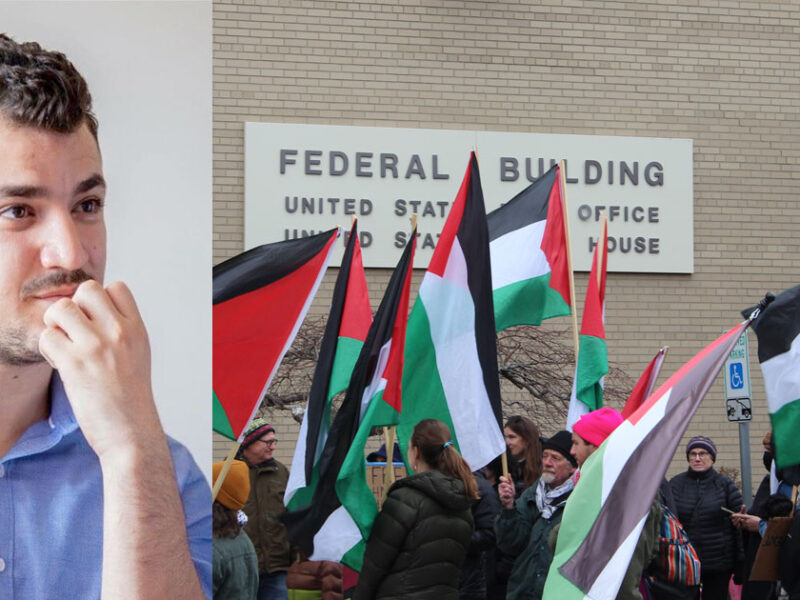Editors’ Note: Parts of this article are repurposed from a January 23, 2024 Rake article. When history repeats itself in such stunning and quick succession, we allow writers some leeway to do the same.
On Monday night, Burlington City Council voted on whether to allow the Apartheid-Free Burlington ballot question to appear on March’s Town Meeting Day ballot for the second time in as many years. This question, a non-binding advisory measure, was initiated by Burlington residents. According to organizers, they collected 2,501 signatures, well above the number necessary to pass the threshold of 5% of registered voters in the city. Such approval votes by city council were — before the blocking of the same measure in January — usually understood as simply procedural and not a reflection of councilors’ opinion on the issue.
The vote resulted in the same outcome as before.
In a 5-5 vote, Democratic city councilors, who released a statement that they would vote no before the meeting, united to block the measure, preventing Burlingtonians from registering their opinion on the issue. Including the rejection of the same measure from January, it is only the third instance in the last decade that The Rake Vermont could find of councilors rejecting an advisory ballot question after it had received a sufficient number of signatures from voters (in 2019, the council blocked a question that asked if voters wanted to cancel the $4 million City Hall Park renovation).
Councilors Becca Brown McKnight, Sarah Carpenter, Evan Litwin, Joan Shannon, and Ben Traverse voted to deny the measure’s inclusion on the ballot. Councilors Gene Bergman, Marek Broderick, Melo Grant, Joe Kane, and Carter Neubieser voted in support. Only 10 votes were cast: Councilor Mark Barlow was absent and Councilor Tim Doherty recently resigned when Phil Scott appointed him to the Vermont Superior Court. While unable to vote on the ballot item, Mayor Emma Mulvaney-Stanak voiced her support for its passage.
In a packed Contois Auditorium, upwards of one hundred people spoke during a public comment period that stretched for hours. A majority testified in support of the measure. They pressed councilors that blocking something that was the result of months of organizing and the collection of more than 2,000 signatures would deny the community the right to weigh in.
Despite claims by its opponents that Burlington should not weigh in on non-local or international matters, there has been plenty of precedent.
- In 1981, Burlington, along with 12 other Vermont towns, put a nuclear freeze ballot measure on the ballot, which passed in Burlington.
- In 2005, a Town Meeting Day referendum to withdraw U.S. troops from Iraq was placed on the ballot, and passed 4,700 to 2,510, stating: “Shall the voters of the City of Burlington advise the President and Congress that Burlington and its citizens strongly support the men and women serving in the United States Armed Forces in Iraq and believe that the best way to support them is to bring them home now?”
- A year later, in 2006, a ballot measure received the necessary signatures to stop the Pentagon from using the Vermont Air National Guard to fight the war in Iraq, stating: “Shall the City Council be advised to use all lawful means to keep the men and women of the Vermont Air National Guard at home to provide air defense for the state and nation, and to prevent their overseas deployment to drop bombs in wars of aggression against other nations?” The council unanimously voted to encourage residents to vote against the measure, yet it still appeared on the ballot and failed by a vote of 5,447 to 4,147.
- In 2007, a ballot item came before Burlington voters that asked, “Shall Vermont’s Congressional Delegation be advised to demand a new, thorough, and truly independent forensic investigation that fully addresses the many questions surrounding the tragic events of September 11, 2001?” The resolution did not pass by a vote of 3,150 to 1,817.
- In 2012, voters approved an advisory referendum placed on the Town Meeting Day ballot to urge the state’s congressional delegation to propose a constitutional amendment “providing that corporations are not persons” which passed with 79 percent of the vote.
Wafic Faour of Vermonters for Justice in Palestine, one of the lead organizers of the ballot measure, told the city council during public comment, “We didn’t pick Apartheid-Free Communities out of thin air. Amnesty International, Human Rights Watch, and the Israeli human rights organization B’Tselem called Israel ‘apartheid.’”
Councilor Joan Shannon, who voted no and pressed for an alternative “mediation” between proponents and opponents of the ballot measure, said, “I don’t believe a binary, accusational question is an opportunity to discuss. It is an opportunity to divide, draw lines in the sand and take positions.” The mayor and councilors mentioned that public discussion events may be facilitated by the Community Justice Center but that they had yet to leave the planning stages. Organizers with the Aparthied-Free Communities measure told The Rake they were unaware these plans had been underway, and no invitation was ever extended to their coalition.
Proponents of the ballot item questioned the usefulness of such discussion events. Councilor Joe Kane, speaking to whether Burlington is a place that would uphold international law, said, “it is difficult to maintain that illusion with votes like this tonight, and when, for instance, the Community Justice Center Director [Rachel Jolly] of all people publicly stated that she was at a loss to understand why Burlington would choose to engage politically in this particular conflict over any of the dozens and dozens of unjust occupations, acts of genocide, authoritarian regimes and brutal massacres.”
Councilor Shannon closed her statements with a familiar demand that movements for justice prioritize civility, asking that conversations be done “not with yelling, not with flag waving, not with threats, not with rock throwing,” in a pointed, accusatory response to those in the audience who were there to engage in one of the most quintessentially peaceful political activities: petitioning one’s government for redress.
Councilor Evan Litwin, another no vote, offered a unique rationale: he said he believed that if he voted to put the measure on the ballot, he would be endorsing its content.
“This pledge to me from where I stand asks me, as a counselor, to adopt a pledge, and that pledge includes the language to join others in working to end all support to Israel’s apartheid regime, settler colonialism, and military occupation. One, I have a First Amendment right not to take a pledge. Second of all, this pledge, non-binding, […] accomplishes nothing,” said Litwin.
Litwin recounted mistakes he made in preparing a ballot measure.“I did not talk to the right people, to change that one word or that one sentence that would have shifted our petition to get to where we wanted it to be.” The Apartheid-Free Communities resolution was drafted by the American Friends Service Committee, a Quaker organization awarded the Nobel Peace Prize in 1947 for aiding Jewish refugees before, during, and after World War II. Apartheid, settler colonialism, and military occupation, words in the Apartheid-Free Communities pledge, to which Litwin objects, are legal terms of art, and mentioned explicitly in United Nations Special Rapporteur on the Occupied Palestinian Territories Francesa Albanese’s October report on the human rights situation in Palestine.
Democratic councilors declined to offer any amendments to the language of the measure, offer a substitute, or refer it to the council’s charter change committee for further discussion. They did not specify the scope, scale, and timeline of the public conversations they preferred. Nor have any councilors who insist on community dialogue instead of the ballot measure organized or held any events along those lines in the past year.
“Conversation on both this ballot measure and the ongoing genocide has happened, continues to happen, and has been attempted,” said Councilor Marek Broderick in support of the measure’s inclusion on the ballot. “I wonder what Mohamed el-Kurd thinks about, what happens when conversations are attempted in Burlington, and who is responsible for preventing the conversation.” El-Kurd, a Palestinian activist, writer and poet, had a speaking event abruptly canceled by the University of Vermont in October 2023, with university leadership citing unspecified “safety concerns.” It was later revealed there were no reported threats regarding the event. Additionally, the shooting of three Palestinian students wearing keffiyehs and speaking Arabic in Burlington in November 2023 sparked not only local, but national conversation. In its aftermath, Burlington City Council Democrats led the charge to vote down a ceasefire resolution, while 13 Vermont towns passed ceasefire resolutions during Town Meeting Day this past March.
Once again left unasked among opponents of the measure — many of whom claimed it would exacerbate division in the community — was what would happen to that division should the council block a voter-backed ballot question that 2,500 Burlingtonians signed, which in any other circumstance, would be on the ballot for Town Meeting Day. Such a question has fresh salience this time, as the nation faces a second Trump administration that looks to erode democratic processes and remove the rights of millions of American residents. Jackson Francis, a Burlington resident and junior at UVM, told the council during public comment, “this I believe is my third time sitting before you as we plead you respect our basic democratic rights. The Democratic party has been crying from the rooftops that Donald Trump is an existential threat to our democracy, yet here you are doing just that.”
In January, those supporting the measure noted that should it not be passed by the council, they will keep coming back until it is placed on the ballot. After Monday’s second rejection by the council, organizers maintained their resolve to collect signatures and bring the Apartheid-Free Communities ballot question back to the Burlington City Council and to other cities and towns across Vermont, with efforts underway in Winooski, Montpelier, Vergennes, and others.
The return of the ballot measure should be nothing new to city councilors; in January, then-Councilor Ali Dieng addressed the question directly. “We are opening the door for more controversy if we do not allow this on the ballot,” said Dieng. “This will come back over, and over, and over again until Burlington says, ‘enough.’”
Speaking in support of the measure, Councilor Gene Bergman stated his belief in Burlington voters’ ability to properly discern information and competing arguments to make decisions for themselves, as he would any other democratic process, even if they did not vote in a way in which he would, noting last month’s presidential election. “I believe in democracy. I believe it is anti-democratic to deny the petitioners the right to place this petition before the voters and campaign for its passage,” he said.
During his comments in January, Bergman referenced his and his family’s own experiences with antisemitism, which is nothing new in Burlington. He reiterated that point Monday, as opponents claim the ballot measure will increase antisemitism. “I reject that it and the movement that has brought it to us does not make me or my family feel we are hated or unsafe,” said Bergman. “As I said last year, the occupation, the rejection of a Palestinian state, the scorched earth conduct of the war itself, are main drivers of increased antisemitism, along with the conflation of Jews in Israel, the unchallenged identification of the Israeli state and his actions with all Jews, if anything, the Israeli war on Gaza over the last year has only intensified this.”
Indeed, instances of antisemitism routinely spike after Israeli attacks and bombing campaigns against Palestinians, as happened in 2021 after Israeli evictions of Palestinian families in the Sheikh Jarrah neighborhood of East Jerusalem drew protests that resulted in injuries to an estimated one thousand Palestinians at the hands of Israeli security. Such evictions, given that East Jerusalem is considered occupied territory, were understood by the UN as potential war crimes. Protests and crackdowns spiraled into armed conflict that cost the lives of more than a dozen Israelis and more than two hundred Palestinians, with tens of thousands of Palestinians displaced after 11 days of near-constant aerial bombardment of Gaza by the Israeli military.
For ballot measure proponents, many of whom are anti-Zionist Jews, it was important for them once more to express that their efforts are not antisemitic and that Zionist Jews have no claim to speak for the entire Jewish community. “I’m here to speak as a Burlington Jew who does not think that condemning occupation and apartheid in Israel harms our community I am also here as a resident of Burlington who believes that keeping items off the ballot is an affront to democracy and to the free and open exchange of ideas,” said Burlington resident Andrew Simon. “The tension in this room tonight could have been avoided. It could have been avoided simply by honoring the petition process in place. I am here yet again, and alas probably not for the last time, to assert that anti-Zionism is not antisemitism, that the Jewish community in Burlington of which I am a part is diverse, querulous, and vibrant. I stand against any attacks on my fellow Jews as I oppose all racism, bigotry, discrimination, and oppression.”
After the meeting adjourned in January, Wafic Faour commented on the council vote in a larger perspective of his decades of advocacy, back some “forty years ago in Harvard Square, when I was leafleting and telling the story of Palestinians.” In Vermont, too, public pressure campaigns have been lengthy ones, and whether they fail or succeed, Faour says that the benefits of educating the public made their efforts worth it. “With every campaign we organize, including thirteen years on Ben & Jerry’s [which ended in a victory], we felt good about it, because it was a tool for the local public to understand the Palestinian question better,” he said.
The council’s blocking of the ballot measure was, for Faour, itself a sign of defeat for the measure’s opponents, as he is confident that the measure would have passed, but that “the bigger loser tonight was democracy in the city of Burlington,” he said. The councilors “were saying ‘no, we don’t trust you to decide about this issue. We are your representatives, we know how to decide instead of you.’ What an insult to the voters.” Faour suggested that voters should and will remember this when several of those councilors are up for election in March.
On Monday, on the steps of city hall, Faour said, “For the second time, they are blocking it. For the second time, members of the Democratic Party are opposing this item, this initiative. Don’t despair. We are not going to go anywhere. We’re going to face democracy. We’re going to rally for democracy. We’re going to be loud and clear.”
Matt Moore is a writer from Vermont. He is on the editorial collective of The Rake Vermont.



